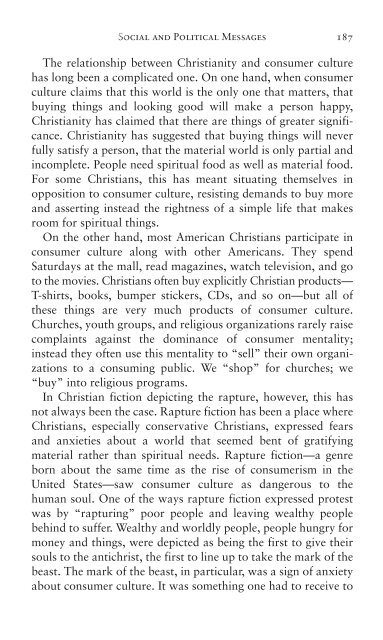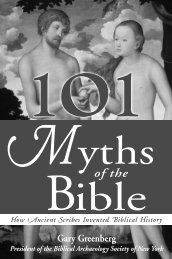Rapture, Revelation, and the End Times - Conscious Evolution TV
Rapture, Revelation, and the End Times - Conscious Evolution TV
Rapture, Revelation, and the End Times - Conscious Evolution TV
Create successful ePaper yourself
Turn your PDF publications into a flip-book with our unique Google optimized e-Paper software.
obin-bobin Social <strong>and</strong> Political Messages 187The relationship between Christianity <strong>and</strong> consumer culturehas long been a complicated one. On one h<strong>and</strong>, when consumerculture claims that this world is <strong>the</strong> only one that matters, thatbuying things <strong>and</strong> looking good will make a person happy,Christianity has claimed that <strong>the</strong>re are things of greater significance.Christianity has suggested that buying things will neverfully satisfy a person, that <strong>the</strong> material world is only partial <strong>and</strong>incomplete. People need spiritual food as well as material food.For some Christians, this has meant situating <strong>the</strong>mselves inopposition to consumer culture, resisting dem<strong>and</strong>s to buy more<strong>and</strong> asserting instead <strong>the</strong> rightness of a simple life that makesroom for spiritual things.On <strong>the</strong> o<strong>the</strong>r h<strong>and</strong>, most American Christians participate inconsumer culture along with o<strong>the</strong>r Americans. They spendSaturdays at <strong>the</strong> mall, read magazines, watch television, <strong>and</strong> goto <strong>the</strong> movies. Christians often buy explicitly Christian products—T-shirts, books, bumper stickers, CDs, <strong>and</strong> so on—but all of<strong>the</strong>se things are very much products of consumer culture.Churches, youth groups, <strong>and</strong> religious organizations rarely raisecomplaints against <strong>the</strong> dominance of consumer mentality;instead <strong>the</strong>y often use this mentality to “sell” <strong>the</strong>ir own organizationsto a consuming public. We “shop” for churches; we“buy” into religious programs.In Christian fiction depicting <strong>the</strong> rapture, however, this hasnot always been <strong>the</strong> case. <strong>Rapture</strong> fiction has been a place whereChristians, especially conservative Christians, expressed fears<strong>and</strong> anxieties about a world that seemed bent of gratifyingmaterial ra<strong>the</strong>r than spiritual needs. <strong>Rapture</strong> fiction—a genreborn about <strong>the</strong> same time as <strong>the</strong> rise of consumerism in <strong>the</strong>United States—saw consumer culture as dangerous to <strong>the</strong>human soul. One of <strong>the</strong> ways rapture fiction expressed protestwas by “rapturing” poor people <strong>and</strong> leaving wealthy peoplebehind to suffer. Wealthy <strong>and</strong> worldly people, people hungry formoney <strong>and</strong> things, were depicted as being <strong>the</strong> first to give <strong>the</strong>irsouls to <strong>the</strong> antichrist, <strong>the</strong> first to line up to take <strong>the</strong> mark of <strong>the</strong>beast. The mark of <strong>the</strong> beast, in particular, was a sign of anxietyabout consumer culture. It was something one had to receive torobin-bobin





